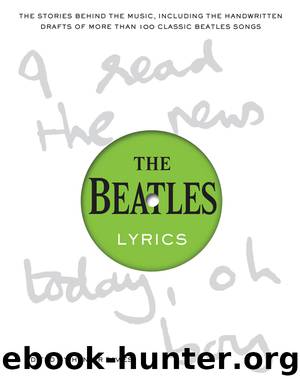The Beatles Lyrics by Hunter Davies

Author:Hunter Davies
Language: eng
Format: epub
Tags: Music / Genres & Styles / Rock, Music / Discography & Buyer’S Guides, Music / Lyrics
Publisher: Little, Brown and Company
Published: 2014-09-29T16:00:00+00:00
Tomorrow Never Knows
This is their most psychedelic song, their most Indian, and so far their most influential in that it had an effect on millions of young people in America and Europe.
The title never appears in the song. It was one of Ringo’s blurted-out remarks that John was forever writing down (other Ringo remarks, never used in a song, included ‘slight bread’ for sliced bread and ‘safely beds’ for safe in bed).
The first line makes it clear it is about drugs: ‘Turn off your mind and float downstream’. And it is about the use of drugs to create, supposedly, a religious experience. But what the song is really about is religion and the Indian Buddhist concepts of transcendentalism and reincarnation, the need to subdue the ego and enter the void. Under LSD, people often begin to think life is all an illusion. Several influential thinkers of the time experimented with the drug, including Aldous Huxley.
Many of the references are from the Tibetan Book of the Dead. In a letter to Dr Lester Grinspoon of Harvard Medical School, written in 1979, John revealed that he had come across the Tibetan Book of the Dead after reading about it in Timothy Leary’s The Psychedelic Experience. Leary was the American high priest of LSD and his book was a treatise on the good he thought it could do, setting people free from their minds and their bodies so that they wouldn’t end up as drones for capitalist, war-mongering governments that wanted them to bomb innocent civilians with napalm in Vietnam.
The song became a feature of many stoned parties of idealistic, right-on, young men and women in the middle sixties.
The music is of course marvellous, and, yes, mind-blowing. As well as Indian instruments, like sitar and tambura, it features many specially devised and original sound effects swirling and whooshing and wailing. A lot of these they brought in from home after experimenting with backwards loops on their tape machines. John wanted it to sound like a group of chanting Tibetan monks, on the top of a mountain, and for him to be like a faint Dalai Lama in the distance–which George Martin and engineer Geoff Merrick, knowing their duties, managed to create.
However the final three lines of the lyric suggest another way of getting through life, without necessarily giving up your mind and body and entering the void–and that is to ‘play the game Existence to the end’. Or the beginning of the beginning…
In an interview with Rolling Stone journalist Jonathan Cott, John admitted that he didn’t know what he was trying to say in ‘Tomorrow Never Knows’: ‘You just find out later. It’s really like abstract art. When you have to think about it to write it, it just means you’ve been laboured at it. But when you just say it, man, it’s a continuous flow. The people who analyse the songs–good on ’em–I don’t mind what they do with them.’
The manuscript, in John’s hand, is an early version with phrases not used
Download
This site does not store any files on its server. We only index and link to content provided by other sites. Please contact the content providers to delete copyright contents if any and email us, we'll remove relevant links or contents immediately.
The Goal (Off-Campus #4) by Elle Kennedy(12432)
Kathy Andrews Collection by Kathy Andrews(10519)
Diary of a Player by Brad Paisley(6866)
What Does This Button Do? by Bruce Dickinson(5527)
Assassin’s Fate by Robin Hobb(5236)
Big Little Lies by Liane Moriarty(4880)
Pale Blue Dot by Carl Sagan(4001)
Sticky Fingers by Joe Hagan(3454)
The Heroin Diaries by Nikki Sixx(2930)
The Death of the Heart by Elizabeth Bowen(2901)
Beneath These Shadows by Meghan March(2718)
The Help by Kathryn Stockett(2703)
Confessions of a Video Vixen by Karrine Steffans(2673)
How Music Works by David Byrne(2525)
Jam by Jam (epub)(2488)
Harry Potter 4 - Harry Potter and The Goblet of Fire by J.K.Rowling(2416)
Strange Fascination: David Bowie: The Definitive Story by David Buckley(2367)
Petty: The Biography by Warren Zanes(2237)
Darker Than the Deepest Sea by Trevor Dann(2206)
